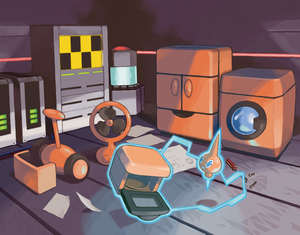List of Pokémon with form differences
Some Pokémon have official major variations between individuals, known as forms (Japanese: すがた form). These variations all have differing sprites or models in the games and are recognized by the "forms" section of the Pokédex.
Starting in Pokémon HeartGold and SoulSilver, every official different form has a name given by the Pokédex, but Arceus, Genesect, and Furfrou's alternate forms were not registered in the Pokédex prior to Pokémon Omega Ruby and Alpha Sapphire. From Generation II to IV, whichever sprite is seen first will be the one displayed in the Pokédex by default; e.g., if West Sea Shellos was encountered first its sprite will appear in the Pokédex by default, whereas if East Sea Shellos was encountered first its sprite will. In Pokémon Black and White, the sprite displayed in the Pokédex can be changed after interacting with Cedric Juniper in Mistralton City, even to a Shiny sprite, if it has been encountered. This option is automatically applied in Pokémon Black 2 and White 2. In Generation VI onwards, the sprite can be changed as long as the player has owned the Pokémon.
At times, these differences are purely cosmetic and have no bearing on the difference in the Pokémon's stats from another; however, several Pokémon differ in stats (other than HP), type, and Ability depending on their form. Among these are several Legendary and Mythical Pokémon, whose unique forms can be changed between at will and are usually spelled as Formes (Japanese: フォルム Forme).
Some Pokémon with form differences can change between their forms (e.g. Castform), while others are fixed and can not be changed (e.g. Unown).
Pokémon with multiple forms
Mega Evolutions
- Main article: Mega Evolution
In Pokémon X and Y, Mega Evolution for some Pokémon was introduced. In general, these Pokémon are able to Mega Evolve in battle if the trainer owns a Key Stone and the Pokémon is holding the Mega Stone specific to their species. Mega Evolutions can have different appearances, types, stats, and abilities from the base form. In Galar, they were removed.
Regional forms
- Main article: Regional form
In Pokémon Sun and Moon, some Pokémon with regional forms were introduced. These Pokémon have adapted specifically for the environment of that region and have different appearances, types and abilities to Pokémon of the same species found elsewhere. The ones found in Alola are known as Alolan forms, while the ones found in Galar are known as Galarian forms.
Gigantamax forms
- Main article: Gigantamax
In Pokémon Sword and Shield, Gigantamax forms were introduced for some Pokémon. If a Pokémon that possesses the Gigantamax Factor is Dynamaxed, it will transform into its Gigantamax form. Gigantamax Pokémon have different appearances and each form is able to use an exclusive G-Max Move. Otherwise, it is functionally identical to Dynamax.
Pikachu
Cosplay Pikachu
- Main article: Cosplay Pikachu
Cosplay Pikachu is a unique female Pikachu who has a black heart-shaped mark near the end of its tail. This unique Pikachu is able to be dressed up into different costumes corresponding to each of the five conditions (Coolness, Beauty, Cuteness, Cleverness, and Toughness) and learn an exclusive move associated with that condition. Cosplay Pikachu can switch costumes anytime at any Contest Hall. It will lose the move it had with the last costume (if it still knows it), and gain the move from the new costume. If Cosplay Pikachu removes its costume while the only move it knows is the move tied to its costume, it learns Thunder Shock.
Unlike other Pikachu, it cannot evolve or breed. Additionally, Cosplay Pikachu cannot be deposited into Pokémon Bank; as a result, it can only be traded between copies of Pokémon Omega Ruby and Alpha Sapphire. Cosplay Pikachu is not present in any other games and does not register as a separate form in the Pokémon Bank Pokédex despite it registering separately in the Pokédex of Pokémon Omega Ruby and Alpha Sapphire.
In Pokémon Omega Ruby and Alpha Sapphire (the only games it appears in), after the player takes part in their first Pokémon Contest Spectacular, a Pokémon Breeder will give the player Cosplay Pikachu.
Pikachu Electric |
Cosplay Pikachu File:Spr 6o 025 C.png Electric Thunder Shock |
Pikachu Rock Star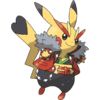 Electric Meteor Mash |
Pikachu Belle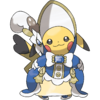 Electric Icicle Crash |
Pikachu Pop Star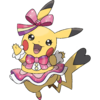 Electric Draining Kiss |
Pikachu, Ph. D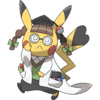 Electric Electric Terrain |
Pikachu Libre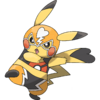 Electric Flying Press |
Pikachu in a cap
- Main article: Pikachu in a cap
These cap-wearing Pikachu are event-exclusive Pokémon that debuted in Pokémon Sun and Moon, and were distributed in celebration of the Pokémon anime's 20th movie, and by extension, the anime's 20th anniversary. Like Ash's Pikachu, these Pikachu are always male and cannot evolve or breed. They also have access to the exclusive Z-Crystal, Pikashunium Z, and its Z-Move, 10,000,000 Volt Thunderbolt.
Six variants exist in Sun and Moon, one for each of Ash's hats between the anime's original series and its Pokémon the Series: Sun & Moon. A seventh variant debuts in Pokémon Ultra Sun and Ultra Moon, wearing the Partner Cap, Ash's hat from the 20th movie. Unlike Cosplay Pikachu, Pikachu in a cap can be stored in Pokémon Bank and fowarded to Pokémon Sword and Shield via Pokémon HOME.
An eighth variant debuts in the Version 1.2.0 update of Pokémon Sword and Shield, wearing the World Cap, Ash's hat from Pokémon Journeys: The Series. It was distributed via universal serial code on October 30, 2020.
Pikachu Electric |
Original Cap Pikachu  Electric |
Hoenn Cap Pikachu  Electric |
Sinnoh Cap Pikachu  Electric |
Unova Cap Pikachu 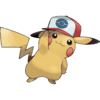 Electric |
| Kalos Cap Pikachu  Electric |
Alola Cap Pikachu  Electric |
Partner Cap Pikachu  Electric |
World Cap Pikachu 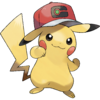 Electric |
Pichu
- Main article: Spiky-eared Pichu
Spiky-eared Pichu is a unique female Pichu who has a tuft of hair on the end of its left ear. Spiky-eared Pichu's Pokéathlon performance stats are different than a normal Pichu's. She cannot evolve or be traded, and she cannot be transferred to the Generation V games.
In Pokémon HeartGold and SoulSilver (the only games it appears in), if the player takes a Pikachu-colored Pichu to the Ilex Forest, Spiky-eared Pichu will join the player.
The Form also appears in Super Smash Bros. Ultimate as an alternate costume for Pichu, marking its first appearance since HeartGold or SoulSilver.
Pichu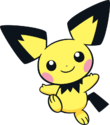 Electric |
Spiky-eared Electric |
Unown

|
This section is incomplete. Please feel free to edit this section to add missing information and complete it. Reason: How does the "separate form identifier" after Generation 3 work? |
Unown has many forms, each of them corresponding to a typographical character. It was the first Pokémon to have multiple forms in the games. From its debut in Generation II, there are 26 forms of Unown, each corresponding to each of the 26 letters of the Latin alphabet. Starting in the Generation III games, Unown has two additional forms, corresponding to the question mark and exclamation mark. These forms are not interchangeable.
In Pokémon Gold, Silver, and Crystal, there is a special Unown Mode, an upgrade to the Pokédex that was developed by the researchers at the Ruins of Alph to record the different forms of Unown, which is available after the player has caught several Unown. In Pokémon HeartGold and SoulSilver, there is the Unown Report, which is obtainable after the player completes the first tile puzzle in the Ruins of Alph.
In the Generation II games, Unown's form is determined by its IVs, which results in some strange phenomena; for example, in Generation II, only Unown I and V can be Shiny due to Shininess also being determined by IVs in these games. In the Generation III games, Unown's form is determined by its personality value. From the Generation IV games onward, Unown's letter is determined by a separate form identifier.
Though the form has no bearing on base stats, punctuation Unown have different performance stats to alphabetical Unown.
A
|
B
|
C
|
D
|
E
|
F
|
G
|
H
|
I
|
J
|
K
|
L
|
M
|
N
|
O
|
P
|
Q
|
R
|
S
|
T
|
U
|
V
|
W
|
X
|
Y
|
Z
|
!
|
?
|
Castform
Castform has four different forms, which its Ability Forecast causes it to change between in different types of weather. It is the first Pokémon to have interchangeable forms in battle in the games.
Normally, Castform is Normal-type and has a plain appearance with a gray body. It takes on this form in clear weather, in any weather without a specific form, and if the weather has its effects negated by Cloud Nine or Air Lock.
In harsh sunlight, Forecast changes Castform to its Sunny Form, which is Fire-type and resembles the sun. In rain, Forecast changes Castform to its Rainy Form, which is Water-type and resembles a raindrop. In hail, Forecast changes Castform to its Snowy Form, which is Ice-type and resembles a snowy cloud. Castform reverts to its normal form when withdrawn from battle.
In Generation III and IV, if Castform's Ability Forecast is suppressed or replaced, Castform will remain in its current form (regardless of the weather). In Generation V onward, if Castform's Ability Forecast is suppressed or replaced, Castform will revert to its normal form (regardless of the weather).
Castform's stats do not change between any of these forms. If a Shiny Castform changes into another form it will not be shiny, however in Pokémon HOME the weather forms have shiny colorations.
Normal Normal |
Sunny Form Fire |
Rainy Form Water |
Snowy Form Ice |
Kyogre and Groudon
In Pokémon Omega Ruby and Alpha Sapphire, Kyogre and Groudon gained new forms, which they achieve through a phenomenon called Primal Reversion. When sent out in battle, Kyogre will change into Primal Kyogre if holding a Blue Orb, while Groudon will change into Primal Groudon if holding a Red Orb. Unlike Mega Evolution, these changes happen automatically once they become active in battle, and the player is not prompted for it.
|
| ||||||||||||||||||||||||||||||||||||||||||||||||||||||||||||||||||||||||||||||||||||
|
| ||||||||||||||||||||||||||||||||||||||||||||||||||||||||||||||||||||||||||||||||||||
Deoxys
Deoxys has four different forms which it can switch between. It was the first Pokémon whose base stats and move compatibility differed depending on its form.
In the Generation III games, Deoxys's forms are game-specific, such that it will always be in one particular form while in the player's possession (although it will be in Normal Forme in the wild).
- In Pokémon Ruby and Sapphire and Pokémon Colosseum and XD, it will be in Normal Forme.
- In Pokémon FireRed, it will be in Attack Forme.
- In Pokémon LeafGreen, it will be in Defense Forme.
- In Pokémon Emerald, it will be in Speed Forme.
From Generation IV onward, the player can switch between its forms using meteorites found in the game.
- In Pokémon Diamond, Pearl, and Platinum, using meteorites outside in Veilstone City.
- In Pokémon HeartGold and SoulSilver, using meteorites outside on Route 3.
- In Black, White, Black 2, and White 2, using meteorites in the Nacrene Museum in Nacrene City.
- In Pokémon X and Y, using meteorites in the Fossil Lab in Ambrette Town.
- In Pokémon Omega Ruby and Alpha Sapphire, using the meteorite in Professor Cozmo's house in Fallarbor Town.
- In Pokémon Sun and Moon and Pokémon Ultra Sun and Ultra Moon, using the meteorite next to Sophocles in the Hokulani Observatory on Mount Hokulani.
Deoxys's Normal Forme is the default form it takes, as well as the form it appears in in Pokémon Ruby and Sapphire. In this form, it has very high Attack, Special Attack, and Speed, but low Defense and Special Defense, alongside a low HP stat.
Deoxys's Attack Forme has even higher Attack and Special Attack than its other forms (having the highest Special Attack and second highest Attack of any non-Mega Evolved, non-Primal Pokémon) and learns more offensive moves. Its Defense and Special Defense are abysmal, much lower than its Normal Forme. Its Speed remains the same as its Normal Forme.
Deoxys's Defense Forme has much higher Defense and Special Defense than its other forms and learns more defensive moves. Its Attack and Special Attack are much lower than its Normal Forme, and its Speed is also significantly lower than its Normal Forme.
Deoxys's Speed Forme has much higher Speed than its other forms (being the Pokémon with the second-highest Speed) and learns many increased priority moves.
Deoxys has the same HP stat in all of its forms.
|
|
|
| ||||||||||||||||||||||||||||||||||||||||||||||||||||||||||||||||||||||||||||||||||||||||||||||||||||||||||||||||||||||||||||||||||||||||||||||||||||||||||||||||||||||||
| Lv. |  Normal Forme Psychic |
 Attack Forme Psychic |
 Defense Forme Psychic |
 Speed Forme Psychic |
|---|---|---|---|---|
| 1 | Leer | |||
| Wrap | ||||
| 7 | Night Shade | |||
| 13 | Teleport | Double Team | ||
| 19 | Knock Off | Taunt | Knock Off | |
| 25 | Pursuit | Spikes | Pursuit | |
| 31 | Psychic | |||
| 37 | Snatch | Superpower | Snatch | Swift |
| 43 | Psycho Shift | |||
| 49 | Zen Headbutt | |||
| 55 | Cosmic Power | Iron Defense | Agility | |
| Amnesia | ||||
| 61 | Recover | Zap Cannon | Recover | |
| 67 | Psycho Boost | |||
| 73 | Hyper Beam | Counter | Extreme Speed | |
| Mirror Coat | ||||
| Moves in bold are STAB. Moves in italics do no damage. | ||||
Burmy and Wormadam
Both Burmy and its female evolution, Wormadam, have three separate forms. Burmy can change form freely, changing its cloak depending on the environment in which it last participated in a battle (so Exp. Share alone will not change its form). Wormadam cannot change form; when a Burmy evolves into Wormadam, it retains its cloak.
Apart from breeding and evolution, Burmy's cloak is purely cosmetic; conversely, different cloaks of Wormadam have different types, stats, and learnsets. Bred Burmy will have the same cloak as the mother, will be in the same cloak as a Burmy or Wormadam bred with Ditto, or will be in Plant Cloak if bred from a Mothim and a Ditto.
If a Burmy last battled in a grassy area or water, it changes into its Plant Cloak. If female, Plant Cloak Burmy will evolve into Plant Cloak Wormadam, which is a Bug/Grass Pokémon. This cloak is composed of leaves and twigs.
If a Burmy last battled in a sandy or rocky area, it changes into its Sandy Cloak. If female, Sandy Cloak Burmy will evolve into Sandy Cloak Wormadam, which is a Bug/Ground Pokémon. This cloak is composed of sand and rocks.
If a Burmy last battled in a building or urban area, it changes into its Trash Cloak. If female, Trash Cloak Burmy will evolve into Trash Cloak Wormadam, which is a Bug/Steel Pokémon. This cloak is composed of pink insulation.
Plant Cloak Bug |
Sandy Cloak Bug |
Trash Cloak Bug |
|
|
| ||||||||||||||||||||||||||||||||||||||||||||||||||||||||||||||||||||||||||||||||||||||||||||||||||||||||||||||||||||||||||||||
| Lv. |  Plant Cloak Bug Grass |
 Sandy Cloak Bug Ground |
 Trash Cloak Bug Steel | ||
|---|---|---|---|---|---|
| 1 | Quiver Dance | ||||
| 1 | N/A | N/A | Metal Burst | ||
| 1 | Sucker Punch | ||||
| 1 | Tackle | ||||
| 1 | Protect | ||||
| 1 | Bug Bite | ||||
| Evo. | Quiver Dance | ||||
| 10 | Protect | ||||
| 15 | Bug Bite | ||||
| 20 | Hidden Power | ||||
| 23 | Confusion | ||||
| 26 | Razor Leaf | Rock Blast | Mirror Shot | ||
| 29 | Growth | Harden | Metal Sound | ||
| 32 | Psybeam | ||||
| 35 | Captivate | ||||
| 38 | Flail | ||||
| 41 | Attract | ||||
| 44 | Psychic | ||||
| 47 | Leaf Storm | Fissure | Iron Head | ||
| 50 | Bug Buzz | ||||
| Moves in bold are STAB. Moves in italics do no damage. | |||||
Cherrim
Cherrim changes form depending on the weather. During harsh sunlight, it changes into Sunshine Form; otherwise, it is in its Overcast Form. Due to its Ability Flower Gift, its Attack and Special Defense will also increase in its Sunshine Form.
In Generation IV, Cherrim changes form independently of its Ability. Starting in Generation V, it is Cherrim's Ability that changes its form.
In Japanese, the names of Cherrim's forms use 「フォルム」 form, the term otherwise only used in the names of forms localized as Forme in English.
Overcast Form Grass |
Sunshine Form Grass |
Shellos and Gastrodon
Shellos and Gastrodon differ in appearance depending on where they were caught. This is purely a cosmetic difference, and these Pokémon cannot change between forms.
In Sinnoh, West Sea Shellos and Gastrodon are encountered west of Mt. Coronet, and are pink in color; East Sea Shellos and Gastrodon are encountered east of Mt. Coronet, and are blue in color. There is also a slight difference in bodily appearance depending on the form.
In other regions, only one form appears in the wild per game. In Generation VI Hoenn, Shellos appears as a hidden Pokémon, with West Sea appearing in Omega Ruby and East Sea appearing in Alpha Sapphire. Gastrodon only appears in its West Sea form in Kalos's Friend Safari. In Alola and Galar, only East Sea Shellos and Gastrodon appear in the wild.
Bred Shellos are the same form as their mother, or the same form as the Shellos or Gastrodon parent if bred with Ditto.
West Sea Water  Water Ground |
East Sea Water  Water Ground |
Rotom
- Heat redirects here. For the Badge given by Flannery, see Badge → Heat Badge.
Rotom has five alternate forms it can change between, in addition to its normal form. To take on these alternate forms, Rotom possesses a different household appliance, and each has its own special move. These alternate forms were introduced in Pokémon Platinum.
- When Rotom has not possessed an appliance (or, in Generation VIII, is possessing a light bulb) it is Electric/Ghost
- Heat Rotom, which has possessed a microwave oven, knows Overheat and is Electric/Fire
- Wash Rotom, which has possessed a washing machine, knows Hydro Pump and is Electric/Water
- Frost Rotom, which has possessed a refrigerator, knows Blizzard and is Electric/Ice
- Fan Rotom, which has possessed an electric fan, knows Air Slash and is Electric/Flying
- Mow Rotom, which has possessed a lawnmower, knows Leaf Storm and is Electric/Grass
In Generation IV, all forms of Rotom are Electric/Ghost-type; from Generation V onward, the appliance forms replace the Ghost type with the type of their associated move. All appliance forms have the same base stats, with a higher total than that of Rotom's regular form; the only base stat of normal Rotom that is higher than its appliance forms is its Speed.
- In Pokémon Platinum, the appliances are located in Rotom's Room in the Team Galactic Eterna Building, which can only be accessed by using the Secret Key.
- In Pokémon HeartGold and SoulSilver, the appliances are located in Rotom's Room in Silph Co., which can be accessed when entering the broken elevator with Rotom as the walking Pokémon.
- In Black, White, Black 2, and White 2, the appliances are located in boxes in the basement of Shopping Mall Nine.
- In Pokémon X and Y, the appliances are located in boxes on the second floor of the Sycamore Pokémon Lab in Lumiose City.
- In Pokémon Omega Ruby and Alpha Sapphire, the appliances are located in boxes in Professor Birch's lab in Littleroot Town.
- In Pokémon Sun and Moon and Pokémon Ultra Sun and Ultra Moon, the appliances are located in boxes in Professor Kukui's lab in Hau'oli Outskirts.
- In Pokémon Sword and Shield, the Rotom Catalog, found in Wyndon, was introduced, which allows the player to change Rotom's form at will wherever they are.
Using these locations, Rotom can also return the appliance to change back to normal form.
Upon changing from an appliance form, it will forget the special move associated with that appliance form. Upon changing into an appliance form, it will learn the special move associated with the form. When changing form, if Rotom knows four moves but not the special move of its previous form, the player will be prompted to replace a move with the new exclusive move (Rotom cannot change to an appliance form unless it does). If Rotom's only known move is its special move and it changes to its normal form, then the Rotom will learn Thunder Shock. In Generation IV and V, if Rotom forgets the move that is tied to its appliance form, it changes back into its normal form. Starting in Generation VI, Rotom can remain in an appliance form even if it forgets the associated special move.
Hatched Rotom are always in normal form.
In Generation IV, Rotom changes back to its normal form when taken into the Union Room or Wi-Fi Club, or when deposited in the Day Care.
Rotom's appliance forms first appeared as silhouettes in August 2008, shortly before the Japanese release of Pokémon Platinum, with a statement that indicated that these Pokémon would be in the game. Days before the game's release, it was revealed that these Pokémon were the alternate forms of Rotom. These new forms made their debut in Pokémon Platinum, and have been included in every core series game since.
There are more forms that Rotom assumes when possessing other appliances such as Rotom Pokédex, Rotom Phone, Rotomi, and Drone Rotom. These forms do not have battle abilities, and instead enhance the function of the device and have the ability to speak. The Rotom Pokédex appears in Sun, Moon, Ultra Sun and Ultra Moon, and the Rotom Phone, Rotomi and Drone Rotom appear in Sword and Shield. The Rotom Pokédex and Rotom Phone are only used by the Rotom that travels with the player as a non-player character, and not by any Rotom in the party.
|
|
| ||||||||||||||||||||||||||||||||||||||||||||||||||||||||||||||||||||||||||||||||||||||||||||||||||||||||||||
|
|
| ||||||||||||||||||||||||||||||||||||||||||||||||||||||||||||||||||||||||||||||||||||||||||||||||||||||||||||
Rotom Pokédex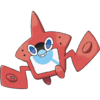
|
Rotom Phone
|
Giratina
Giratina has two forms it can change between. The Origin Forme was introduced in Pokémon Platinum.
In the Pokémon world, it is normally in its Altered Forme, which is a winged hexapod; in the Distortion World or while holding a Griseous Orb, it is in its Origin Forme, which is serpentine with six appendages.
The two forms have different stats and Abilities; the Origin Forme is more offense-oriented, while the Altered Forme is more defense-oriented.
|
| ||||||||||||||||||||||||||||||||||||||||||||||||||||||||||||||||||||||||||||||||||||
Shaymin
Shaymin has two forms it can change between. The Sky Forme was introduced in Pokémon Platinum.
Normally, Shaymin is in its Land Forme, which is Grass-type and resembles a hedgehog. When exposed to a Gracidea, Shaymin transforms into its Sky Forme, which is Grass/Flying-type and white in color.
Sky Forme Shaymin will change back into and remain in its Land Forme at night or if it is frozen; Shaymin also changes back to Land Forme when deposited in the PC (prior to Generation VII), when withdrawn from the PC (Generation VII), when deposited in Pokémon Bank, or when deposited in the Pokémon Day Care/Pokémon Nursery.
The two forms have different stats, Abilities, types, learnsets, and cries.
|
| ||||||||||||||||||||||||||||||||||||||||||||||||||||||||||||||||||||||||||||||||||||
| Lv. | File:492Shaymin-Land.png Land Forme Grass |
 Sky Forme Grass Flying |
|---|---|---|
| 1 | Growth | |
| 10 | Magical Leaf | |
| 19 | Leech Seed | |
| 28 | Synthesis | Quick Attack |
| 37 | Sweet Scent | |
| 46 | Natural Gift | |
| 55 | Worry Seed | |
| 64 | Aromatherapy | Air Slash |
| 73 | Energy Ball | |
| 82 | Sweet Kiss | |
| 91 | Healing Wish | Leaf Storm |
| 100 | Seed Flare | |
| Moves in bold are STAB. Moves in italics do no damage. | ||
Arceus
Arceus has eighteen different type form variations, which correspond to the eighteen different types.
Arceus's type depends on its held Plate or type-specific Z-Crystal, becoming the same type as the type that Plate enhances or the Z-Crystal corresponds to, remaining Normal-type when not holding a Plate or Z-Crystal.
While its base stats remain constant despite its changing type, its Pokéathlon performance differs. Additionally, it can learn Draco Meteor only while holding the Draco Plate.
In the Generation IV games, there is unused data and a sprite programmed for a ???-type Arceus, but it cannot be obtained in the games as there is no ???-type Plate. This data no longer exists since Generation V due to the removal of the ??? type.
Prior to Pokémon Omega Ruby and Alpha Sapphire, Arceus's alternate forms are not registered in the Pokédex.
Normal 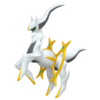
|
Fire 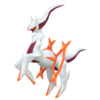
|
Water 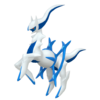
|
Electric 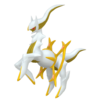
|
Grass 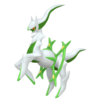
|
Ice 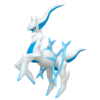
|
Fighting 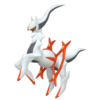
|
Poison 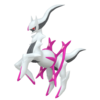
|
Ground 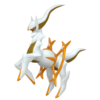
|
Flying 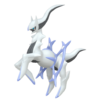
|
Psychic 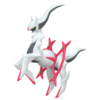
|
Bug 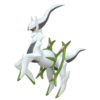
|
Rock 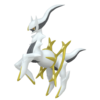
|
Ghost 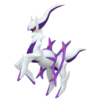
|
Dragon 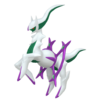
|
Dark 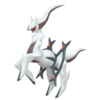
|
Steel 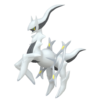
|
Fairy 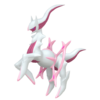
|
Basculin
Basculin has two different forms, the Red-Striped Form and the Blue-Striped Form. The Red-Striped Form has a red stripe with wide eyes and spiky fins; the Blue-Striped Form has a blue stripe with squinted eyes and smooth fins. These forms are non-interchangeable.
However, Basculin's evolution Basculegion does not appear to have any form differences.
- In Pokémon Black and Black 2, Red-Striped Basculin can be encountered normally, while Blue-Striped Basculin can only be encountered by surfing on or fishing in rippling water.
- In Pokémon White and White 2, Blue-Striped Basculin can be encountered normally, while Red-Striped Basculin can only be encountered by surfing on or fishing in rippling water.
- In Pokémon X, Blue-Striped Basculin can only be encountered using a Good Rod while Red-Striped Basculin can only be encountered using a Super Rod. This order is reversed in Pokémon Y, with Red-Striped Basculin requiring a Good Rod and Blue-Striped Basculin requiring a Super Rod. Route 21 is the exception, where only Red-Striped Basculin can be caught with either rod.
- In Ultra Sun and Ultra Moon, Red-Striped Basculin are found exclusively in Ultra Sun, while Blue-Striped Basculin are found exclusively in Ultra Moon.
- In Sword and Shield, Red-Striped Basculin are found exclusively in Sword, while Blue-Striped Basculin are found exclusively in Shield.
Bred Basculin are the same form as their mother, or the same form as the Basculin parent if bred with Ditto.
Wild red-striped Basculin have a 5% chance of holding a Deep Sea Tooth while wild blue-striped Basculin have a 5% chance of holding a Deep Sea Scale.
In Pokémon Black and White, blue-striped Basculin have the same two standard possible Abilities as red-striped Basculin—Reckless and Adaptability (and are listed as such in Pokédex 3D); however, the blue-striped Basculin that can be obtained via in-game trade in Pokémon White has the Ability Rock Head. In Pokémon Black 2 and White 2, wild blue-striped Basculin's two standard possible Abilities are Rock Head and Adaptability, while red-striped Basculin's stay the same (and are listed as such in Pokédex 3D Pro); however, blue-striped Basculin bred in Pokémon Black 2 and White 2 have Reckless and Adaptability as their two standard Abilities. When a blue-striped Basculin with Reckless is transferred from Generation V to Pokémon Bank, its Ability is changed to Rock Head.
|
| ||||||||||||||||||||||||||||||||||||||||||||||||||||||||||||||||||||||||
Darmanitan
If Darmanitan has Zen Mode as its Ability, it changes from Standard Mode into Zen Mode when its HP drops to or below half in battle. It can only remain in Zen Mode in battle.
Standard Mode Darmanitan is Fire-type and red in color. Zen Mode Darmanitan is Fire/Psychic-type and blue in color. Galarian Darmanitan is Ice-type and white in color with blue accents, while Galarian Zen Mode Darmanitan is Ice/Fire-type and white in color with red accents.
The original two forms have different stats, such that Zen Mode Darmanitan swaps the Attack and Special Attack of Standard Mode, and has higher defenses but lower Speed. On the other hand, Galarian Darmatian, in its Zen Mode, focuses on rushing the opposition with increased Attack and Speed.
|
| ||||||||||||||||||||||||||||||||||||||||||||||||||||||||||||||||||||||||
|
| ||||||||||||||||||||||||||||||||||||||||||||||||||||||||||||||||||||||||
Deerling and Sawsbuck
Deerling and Sawsbuck have four different interchangeable forms, each corresponding to a season. These forms are purely cosmetic.
In the Generation V games, Deerling and Sawsbuck will only change their form to match the current season if they are in the player's party when: the player steps outside from a cave or building such that the season changes, the player receives an Egg from the Day-Care Man, or a saved game is loaded. All wild, bred, or NPC Trainer-owned Deerling and Sawsbuck will match the current season, with the exception of Trainers in the Battle Subway and the Pokémon World Tournament where these Pokémon are always in Spring Form.
In Generation VI, all wild and NPC Trainer-owned Deerling and Sawsbuck appear in Spring Form. Because seasons have been abandoned as a mechanic, Deerling and Sawsbuck do not change appearance, and their Summer, Autumn, and Winter forms must be transferred from a Generation V game. Bred Deerling are the same form as their mother, or the same form as the Deerling or Sawsbuck parent if bred with Ditto.
Spring Form Normal Grass  Normal Grass |
Summer Form Normal Grass  Normal Grass |
Autumn Form Normal Grass  Normal Grass |
Winter Form Normal Grass  Normal Grass |
Forces of Nature
The Forces of Nature—Tornadus, Thundurus, and Landorus—have two interchangeable forms each.
Normally, they are in their Incarnate Forme. When exposed to a Reveal Glass, they change into their Therian Forme. Their Therian Formes were introduced in Pokémon Black 2 and White 2.
The two forms have different stats, Abilities, and cries. Even if they have their Hidden Ability, in Therian Forme each Pokémon only has one possible Ability.
In the Generation V games, they cannot be traded while in their Therian Forme. This is possibly to prevent Therian Formes from being traded to Black and White, where they don't exist.
|
|
| ||||||||||||||||||||||||||||||||||||||||||||||||||||||||||||||||||||||||||||||||||||||||||||||||||||||||||||
|
|
| ||||||||||||||||||||||||||||||||||||||||||||||||||||||||||||||||||||||||||||||||||||||||||||||||||||||||||||
Kyurem
Kyurem, in addition to its normal form, has two other forms: White Kyurem and Black Kyurem. They are the game mascots of Pokémon Black 2 and White 2, which they were introduced in.
In the games, Kyurem changes its form through the use of the DNA Splicers, which fuses it with Reshiram or Zekrom. The combination retains Kyurem's Poké Ball, held item, game of origin, personality value, IVs, EVs, nickname, OT, Trainer ID number and Secret ID number, met location, and Pokérus. This fusion is reversible, with Reshiram or Zekrom remaining unaltered from before being fused, including whatever item it may have been holding. The DNA Splicers can only fuse one Kyurem at a time. White Kyurem and Black Kyurem cannot be deposited into Pokémon Bank or Pokémon HOME, nor can they be traded or released without unfusing first.
White Kyurem has the Ability Turboblaze, learns the moves Fusion Flare and Ice Burn by leveling up, and its cry is a combination of normal Kyurem and Reshiram's cries.
Black Kyurem has the Ability Teravolt, learns the moves Fusion Bolt and Freeze Shock by leveling up, and its cry is a combination of normal Kyurem and Zekrom's cries.
When Kyurem becomes fused or separated with either Reshiram or Zekrom while it knows certain moves, Kyurem's moveset will automatically be updated without prompting the player. Fusing Kyurem will replace Scary Face with either Fusion Bolt or Fusion Flare, and replace Glaciate with either Freeze Shock or Ice Burn, if one or both of these moves are present. Unfusing Kyurem will perform the inverse of these move transformations. In Generation VIII, it is possible for Kyurem to learn Scary Face by TM after becoming fused; starting in these games, if Kyurem becomes unfused while it knows both Scary Face and the fusion move, Scary Face will be deleted before the fusion move changes back to Scary Face.
|
|
| ||||||||||||||||||||||||||||||||||||||||||||||||||||||||||||||||||||||||||||||||||||||||||||||||||||||||||||
| Lv. |  Kyurem Dragon Ice |
 White Kyurem Dragon Ice |
 Black Kyurem Dragon Ice |
|---|---|---|---|
| 1 | Dragon Breath | ||
| Noble Roar | |||
| Ancient Power | |||
| Freeze-Dry | |||
| 8 | Slash | ||
| 16 | Endeavor | ||
| 24 | Dragon Pulse | ||
| 32 | Ice Beam | ||
| 40 | Hyper Voice | ||
| 48 | Scary Face | Fusion Flare | Fusion Bolt |
| 56 | Blizzard | ||
| 64 | Imprison | ||
| 72 | Outrage | ||
| 80 | Glaciate | Ice Burn | Freeze Shock |
| 88 | Sheer Cold | ||
| Moves in bold are STAB. Moves in italics do no damage. | |||
Keldeo
Keldeo has two interchangeable forms: Ordinary Form and Resolute Form. These forms are mostly cosmetic. The Resolute Form was introduced in Pokémon Black 2 and White 2.
If Keldeo is taught Secret Sword in Pokémon Black 2 and White 2, or any game in Generations VI or later, it will change into Resolute Form. If it forgets Secret Sword, it returns to Ordinary Form. Keldeo taught Secret Sword in Pokémon Black and White remain in Ordinary Form when transferred to later games.
In Generation VIII, an Ordinary Form Keldeo that has Secret Sword after being transferred from Black or White will also change to Resolute Form at the end of any battle, or upon learning or deleting any move other than Secret Sword.
Ordinary Form Water Fighting |
Resolute Form Water Fighting |
Meloetta
Meloetta has two interchangeable forms: Aria Forme and Pirouette Forme. Aria Forme is Normal/Psychic. Pirouette Forme is Normal/Fighting.
Normally, it is in Aria Forme, which is the only form it can take outside of battle. If Meloetta uses the move Relic Song in battle, it changes between the two forms. It reverts to Aria Forme if withdrawn.
|
| ||||||||||||||||||||||||||||||||||||||||||||||||||||||||||||||||||||||||||||||||||||
Genesect
In the games, Genesect changes forms when a Drive is attached to its back. These forms have no direct effect, although they do change the type of Genesect's signature move Techno Blast.
- If no Drive is held, Techno Blast will be Normal-type and Genesect will appear to have a dark yellow Drive.
- If a Shock Drive is held, Techno Blast will be Electric-type and Genesect will appear to have a light yellow Drive.
- If a Burn Drive is held, Techno Blast will be Fire-type and Genesect will appear to have a red Drive.
- If a Chill Drive is held, Techno Blast will be Ice-type and Genesect will appear to have an ice blue Drive.
- If a Douse Drive is held, Techno Blast will be Water-type and Genesect will appear to have a blue Drive.
Prior to Pokémon Omega Ruby and Alpha Sapphire, Genesect's alternate appearances are not registered in the Pokédex.
Normal Genesect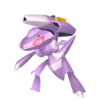 Bug Steel |
Shock Drive Genesect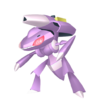 Bug Steel |
Burn Drive Genesect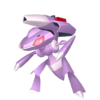 Bug Steel |
Chill Drive Genesect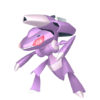 Bug Steel |
Douse Drive Genesect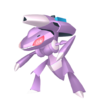 Bug Steel |
Greninja
- Ash-Greninja redirects here. For the Greninja that belonged to Ash Ketchum, see Ash's Greninja.
In the XY&Z arc of the anime's Pokémon the Series: XY, Ash's Greninja gained the ability to transform into a stronger form known as "Ash-Greninja" through an occurrence known as the Bond Phenomenon. In the games, a Greninja with the Ability Battle Bond will transform into Ash-Greninja after it causes an opponent to faint. In this form, the move Water Shuriken will become more powerful and always hit 3 times. Greninja will stay in this form until the end of battle or it faints. A Greninja with Battle Bond can be transferred to Pokémon Sun and Moon from the Special Demo Version.
Internally, normal Greninja with Battle Bond are considered a separate form than that of Greninja with Torrent or Protean. These Greninja are always male and cannot breed.
|
| ||||||||||||||||||||||||||||||||||||||||||||||||||||||||||||||||||||||||
Vivillon
Vivillon has 18 different distinct patterns depending on the set geographic location of the Nintendo 3DS system on which the Scatterbug was generated (for Eggs, this means the game in which the Egg was created). This form cannot be changed. The pattern of Vivillon encountered within a game is set when the save file is created.
Bred Scatterbug will evolve into Vivillon with the same pattern as that of the breeding player's game, regardless of its parents.
Archipelago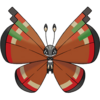 Bug Flying |
Continental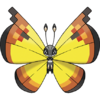 Bug Flying |
Elegant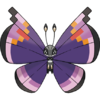 Bug Flying |
Garden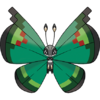 Bug Flying |
High Plains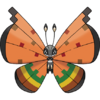 Bug Flying |
Icy Snow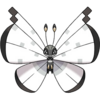 Bug Flying |
Jungle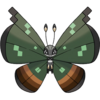 Bug Flying |
Marine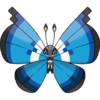 Bug Flying |
Meadow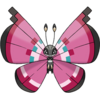 Bug Flying |
Modern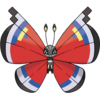 Bug Flying |
Monsoon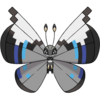 Bug Flying |
Ocean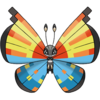 Bug Flying |
Polar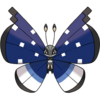 Bug Flying |
River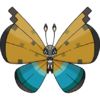 Bug Flying |
Sandstorm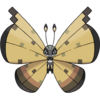 Bug Flying |
Savanna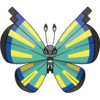 Bug Flying |
Sun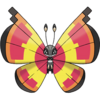 Bug Flying |
Tundra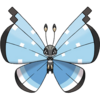 Bug Flying |
Note that Vivillon's pattern depends on the set geographic location of the Nintendo 3DS system when the save file was created. Locations within a country can have a different form than merely selecting a country without setting a specific location. The China region is only available from the 3DS distributed for that region.
- Archipelago Pattern Vivillon can be found in Puerto Rico, Anguilla, the Dominican Republic, Haiti, north Venezuela, the regions of Atlantic, Guajira and Magdalena regions from Colombia and the Yucatán region of Mexico.
- Continental Pattern Vivillon can be found in China, Denmark, Germany, some countries of Argentina and South Korea.
- Elegant Pattern Vivillon is found in most areas of Japan.
- Garden Pattern Vivillon can be found in the United Kingdom, Ireland, and New Zealand.
- High Plains Pattern Vivillon is found in the Western United States, although some players in Colorado report finding the Continental Pattern instead. The High Plains Pattern also appears in the British Columbia province of Canada and north Mexico.
- Icy Snow Pattern Vivillon has been reported in far northern regions of Norway and Russia and all Finland except Åland, as well as Canada's Northwest and Yukon Territories.
- Jungle Pattern Vivillon has been reported in Malaysia, all Colombia minus Atlantic, Guajira and Magdalena regions, central and south Venezuela, north Peru, Panama, Costa Rica and Singapore.
- Marine Pattern Vivillon has been reported in all Chile minus the Magallanes region, all Spain except the Catalonia region, Portugal, the territories of Acre, Amapá, Amazonas, Rondônia and Roraima from Brazil and Italy.
- Meadow Pattern Vivillon is known to be found in large sections of France and in Catalonia (Spain).
- Modern Pattern Vivillon has been found in central and southeastern United States.
- Monsoon Pattern Vivillon is known to come from India, Hong Kong, Okinawa, the Tibet region of China and Taiwan.
- Ocean Pattern Vivillon comes from Hawaii and Réunion.
- Polar Pattern Vivillon is known to come from Alaska, the region of Magallanes from Chile, the regions of Tierra del Fuego and Santa Cruz from Argentina, the northeastern United States, and large sections of Canada. Swedish players report finding Polar Pattern Vivillon as well.
- River Pattern Vivillon has been found in most regions of Australia, the Canary Islands (Spain) and several African countries.
- Sandstorm Pattern Vivillon is found throughout the Middle East and Turkey.
- Savanna Pattern Vivillon is known to come from various territories of Argentina, all Brazil, except Acre, Amapá, Amazonas, Rondônia and Roraima territories, south Peru, Paraguay, Uruguay and Bolivia.
- Sun Pattern Vivillon has been reported throughout south Mexico, Guatemala, Honduras, Nicaragua, El Salvador, Belize, Zimbabwe and the Northern Territory of Australia.
- Tundra Pattern Vivillon has been found in Hokkaido, Norway, and Iceland.
There are also two event-exclusive patterns, the Poké Ball Pattern and the Fancy Pattern. The Poké Ball Pattern resembles a standard Poké Ball, and was first distributed in Paris, France to promote the temporary Pokémon Center store. The Fancy Pattern was distributed via the Nintendo Network from July 8 to 31, 2014 to celebrate the GTS's 100 millionth Pokémon trade.
Poké Ball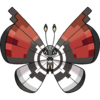 Bug Flying |
Fancy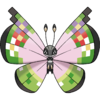 Bug Flying |
Flabébé, Floette, and Florges
Flabébé, Floette, and Florges can hold five different-colored flowers: red, yellow, orange, blue, and white. The flower color is maintained through evolution and cannot be changed.
In Pokémon X and Y, Flabébé appear in the wild in flowers, with the colors of Flabébé's flower available depending on the flower patch (although each flower patch has multiple Flabébé flower colors). In Pokémon Ultra Sun and Ultra Moon, wild Yellow Flower Flabébé appear in Melemele Meadow, Orange and White Flower Flabébé exclusively appear as its allies called in an SOS Battle. Wild Red Flower Floette appear in Ula'ula Meadow, Orange and White Flower Floette exclusively appear as its allies called in an SOS Battle and do not call for help. Wild Blue Flower Floette appear in Poni Meadow and do not call for help.
Bred Flabébé have the same color flower as their mother, or the same form as the Flabébé, Floette, and Florges parent if bred with Ditto.
In Generation VI, since only Blue Flower, Red Flower, and Yellow Flower Floette can appear in the Friend Safari, only these forms of Flabébé, Floette, and Florges can have their Hidden Ability Symbiosis. In Generation VII, all forms of the Flabébé evolutionary line can have their Hidden Ability, though the Blue Flower forms cannot be caught with it and must be transferred from a prior game.
Red Flower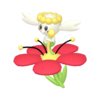 Fairy 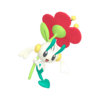 Fairy 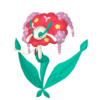 Fairy |
Yellow Flower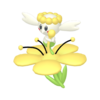 Fairy 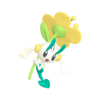 Fairy 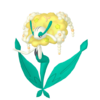 Fairy |
Orange Flower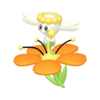 Fairy 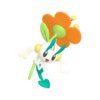 Fairy 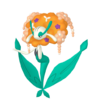 Fairy |
Blue Flower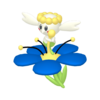 Fairy 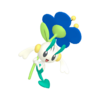 Fairy 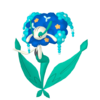 Fairy |
White Flower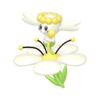 Fairy 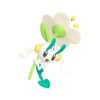 Fairy 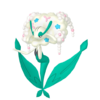 Fairy |
In the storyline of Pokémon X and Y, there is also a unique Floette who AZ befriended 3,000 years ago. The flower it wields has a different design than normal, resembling the structure of the ancient ultimate weapon constructed by AZ; the flower also has a blue, red, and white color instead of green, yellow, and white, reflecting the colors of the French tricolor. The Generation VI and VII games include unused data for a trainable unique Floette. Unlike the other forms, it can learn the move Light of Ruin, and is the only Pokémon able to do so.
| Spoilers end here. |
|---|
Furfrou
Furfrou can be groomed into one of ten different trims. These trims only last for five days after being groomed. Furfrou will also lose its trim when it is deposited in the PC (Generation VI), withdrawn from the PC (Generation VII), deposited in Pokémon Bank, or deposited in the Pokémon Day Care/Pokémon Nursery.
The location at which Furfrou can be groomed differs between games.
- In Pokémon X and Y, Furfrou can be groomed at Friseur Furfrou in Lumiose City for $500. The player gains access to more trims as they become more stylish.
- In Pokémon Omega Ruby and Alpha Sapphire, Furfrou can be groomed at the Pokémon Fan Club in Slateport City for $500.
- In Pokémon Sun and Moon and Pokémon Ultra Sun and Ultra Moon, for $500 Furfrou can be groomed by a Punk Girl at Malie City's salon or a Beauty at Hau'oli City's salonUSUM.
In Pokémon X and Y only, Furfrou's trims are not registered in the Pokédex.
Natural Form Normal |
Heart Trim Normal |
Star Trim Normal |
Diamond Trim Normal |
Debutante Trim Normal |
Matron Trim Normal |
Dandy Trim Normal |
La Reine Trim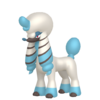 Normal |
Kabuki Trim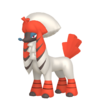 Normal |
Pharaoh Trim Normal |
Aegislash
Aegislash, due to its Ability Stance Change, can change forms in battle depending on the move it uses. Initially in Shield Forme, using a damaging move will change it to Blade Forme, while using King's Shield will change it back into Shield Forme. Outside of battle it is always in Shield Forme.
Shield Forme Aegislash has high Defense and Special Defense, while Blade Forme Aegislash has high Attack and Special Attack.
|
| ||||||||||||||||||||||||||||||||||||||||||||||||||||||||||||||||||||||||||||||||||||
Pumpkaboo and Gourgeist
Pumpkaboo and Gourgeist can be of Small, Average, Large and Super Size. Larger sizes of Pumpkaboo are rarer to encounter in the wild.
Different sizes have different base stats. For Pumpkaboo, with each increase in size, its base HP stat increases by 5 points while its base Speed stat decreases by 5 points. For Gourgeist, with each increase in size, its base HP stat increases by 10 points and its base Attack stat increases by 5 points while its base Speed stat decreases by 15 points. Consequently, the base stat total of a Pumpkaboo or Gourgeist does not vary with size.
Bred Pumpkaboo are the same size as their mother, or the same form as the Pumpkaboo or Gourgeist parent if bred with Ditto.
Wild Super Size Pumpkaboo will always hold a Miracle Seed, whereas other sizes will never hold an item in the wild. Super Size variants have different, lower pitched cries than the other forms.
Previously, only Average Size and Super Size Pumpkaboo and Gourgeist can have their Hidden Ability Insomnia. Average Size can be obtained with its Hidden Ability from the Friend Safari; Super Size could be obtained with its Hidden Ability from events. Starting in Version 1.2.0 of Pokémon Sword and Shield, all sizes could be obtained with their Hidden Abilities.
The different sizes of Pumpkaboo and Gourgeist do not use different menu sprites.
|
|
|
| ||||||||||||||||||||||||||||||||||||||||||||||||||||||||||||||||||||||||||||||||||||||||||||||||||||||||||||||||||||||||||||||||||||||||||||||||
|
|
|
| ||||||||||||||||||||||||||||||||||||||||||||||||||||||||||||||||||||||||||||||||||||||||||||||||||||||||||||||||||||||||||||||||||||||||||||||||
Xerneas
Xerneas has two forms: Neutral Mode and Active Mode. There is no gameplay difference between them; Xerneas appears in Active Mode in battle, and appears in Neutral Mode in situations outside of battle, such as cutscenes, the Pokédex, the Pokémon screen, and Pokémon-Amie. According to the Pokédex, Xerneas shares everlasting life while it is in Active Mode.
Xerneas's horns and some highlights in its fur are light blue in Neutral Mode and light gold in Active Mode. In Active Mode, the protrusions on its horns as well as its back spots light up in several colors.
Neutral Mode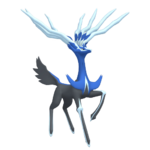 Fairy |
Active Mode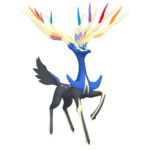 Fairy |
Zygarde
Zygarde has three different Formes, as well as two distinct constituent parts. The 50% Forme debuted in Pokémon X and Y. The other two Formes and both constituent parts debuted in the anime during the XY&Z arc of Pokémon the Series: XY, and made their core series debut in Pokémon Sun and Moon.
A Zygarde Cell is a single cell of Zygarde. They can be found scattered throughout the region. They do not have thoughts or will, and can communicate with Zygarde Cores via telepathy. They are incapable of performing moves.
A Zygarde Core is a "brain" of Zygarde. They can communicate with Zygarde Cells and other Cores via telepathy. They take action when the region's ecosystem is threatened.
Zygarde 10% Forme is a Zygarde with 10% of its cells. It has razor-sharp teeth, and can reach speeds up to 60 mph (100 km/h). It can change into Complete Forme with its Ability Power Construct.
Zygarde 50% Forme is a Zygarde with 50% of its cells. It watches over and maintains the local ecosystem. It can change into Complete Forme with its Ability Power Construct.
In battle, a Zygarde with the Power Construct Ability will change into Complete Forme when its HP falls below half in a battle.
Zygarde Complete Forme is a Zygarde with 100% of its cells. Zygarde only takes on this form when the ecosystem is under threat and it believes Zygarde 50% Forme is unable to deal with it. Its power is said to exceed that of Xerneas and Yveltal.
In Pokémon Sun, Moon, Ultra Sun, and Ultra Moon, the Aether Base on Route 16 on Ula'ula Island contains a Reassembly Unit, which can be used to create Zygarde 10% Forme and Zygarde 50% Forme from Zygarde Cells and Cores in the player's Zygarde Cube, or disassemble Zygarde with Aura Break back into Cells and Cores (Zygarde with Power Construct cannot be separated).
The player can create any number of Zygarde using the Reassembly Unit as long they have enough Cores and Cells. A Zygarde 10% Forme with Aura Break can be assembled with 10 Cells and Cores, a Zygarde 50% Forme with Aura Break can be assembled with 50 Cells and Cores, and a Zygarde 50% Forme with Power Construct can be assembled with 100 Cells and Cores. The Zygarde Cube can be used to change a Zygarde with Power Construct between 10% Forme and 50% Forme; Zygarde with Aura Break cannot change forms.
While only 100 Cells and Cores are normally available in one save file, the player can obtain more by separating Zygarde with Aura Break from other games. A Zygarde separated into Cells will be lost forever.
In Pokémon Sun and Moon, the player can collect Zygarde Cells and Cores in the overworld throughout the Alola region after obtaining the Zygarde Cube. There are a total of 5 Cores and 95 Cells throughout the region.
In Pokémon Ultra Sun and Ultra Moon, the player can catch a wild Zygarde 50% Forme in Resolution Cave on Poni Island; after the player catches this Zygarde, Dexio will battle the player on Route 16, and upon being defeated he will give the player the Zygarde Cube (containing 40 Zygarde Cells) and Zygarde 10% Forme.
Zygarde Cell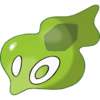
|
Zygarde Core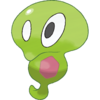
|
|
|
| ||||||||||||||||||||||||||||||||||||||||||||||||||||||||||||||||||||||||||||||||||||||||||||||||||||||||||||
Hoopa
Hoopa has two Formes it can change between, using the Prison Bottle to temporarily change to its more powerful Forme.
Normally, Hoopa Confined is the Forme taken by Hoopa, which is Psychic/Ghost. When exposed to a Prison Bottle, Hoopa transforms into Hoopa Unbound, which is Psychic/Dark. Hoopa Unbound was introduced in Pokémon Omega Ruby and Alpha Sapphire.
Hoopa Unbound will change back into Hoopa Confined after three days have passed since using the Prison Bottle; Hoopa also changes back to Hoopa Confined when deposited in the PC (prior to Generation VII), when withdrawn from the PC (Generation VII), or when deposited in the Pokémon Day Care/Pokémon Nursery.
The two forms have different stats, types, learnsets, and cries. Unlike other Pokémon with form differences, Hoopa has more than one category.
|
| ||||||||||||||||||||||||||||||||||||||||||||||||||||||||||||||||||||||||||||||||||||
| Lv. |  Hoopa Confined Psychic Ghost |
 Hoopa Unbound Psychic Dark |
|---|---|---|
| 1 | Hyperspace Hole | Hyperspace Fury |
| Trick | ||
| Destiny Bond | ||
| Ally Switch | ||
| Confusion | ||
| 6 | Astonish | Astonish |
| 10 | Magic Coat | |
| 15 | Light Screen | |
| 19 | Psybeam | |
| 25 | Skill Swap | |
| 29 | Power Split | |
| Guard Split | ||
| 35 | Phantom Force | N/A |
| 46 | Zen Headbutt | Knock Off |
| 50 | Wonder Room | |
| Trick Room | ||
| 55 | Shadow Ball | Dark Pulse |
| 68 | Nasty Plot | N/A |
| 75 | Psychic | |
| 85 | Hyperspace Hole | Hyperspace Fury |
| Moves in bold are STAB. Moves in italics do no damage. | ||
Oricorio
Oricorio has four distinct styles. Depending on which island the player is on, the form that is encountered will be different. Baile Style is only found on Ula'ula Island, Pom-Pom Style on Melemele Island, Pa'u Style on Akala Island, and Sensu Style on Poni Island. Oricorio can manually change forms by sipping the nectar of certain flowers. Each of Oricorio's four styles has a different primary type; Oricorio's signature move Revelation Dance changes type to match the user's primary type. The forms also have different cries.
Baile Style Fire Flying |
Pom-Pom Style Electric Flying |
Pa'u Style Psychic Flying |
Sensu Style Ghost Flying |
Lycanroc
Lycanroc has three forms: Midday Form, Midnight Form, and Dusk Form. In Pokémon Sun and Pokémon Ultra Sun, Rockruff will only evolve into Midday Form Lycanroc, while in Pokémon Moon and Pokémon Ultra Moon, Rockruff will only evolve into Midnight Form Lycanroc. Both Midday Form and Midnight Form can be caught in the wild in both Pokémon Sun and Pokémon Moon. In Pokémon Sword and Shield, Rockruff's evolution now depends on the time of day rather than what game it is in.
Dusk Form debuted in Pokémon Ultra Sun and Ultra Moon; only special Rockruff with the Ability Own Tempo can evolve into Dusk Form Lycanroc. Own Tempo Rockruff and Dusk Form Lycanroc can breed to produce more Own Tempo Rockruff. Own Tempo Rockruff and Dusk Form Lycanroc were later made available through normal means in Max Raid Battles in Pokémon Sword and Shield's The Isle of Armor.
Lycanroc's Forms have different stats, Abilities, learnsets, and cries.
|
|
| ||||||||||||||||||||||||||||||||||||||||||||||||||||||||||||||||||||||||||||||||||||||||||||||||||||||||||||||||||||||||||||||
| Lv. |  Midday Form Rock |
 Midnight Form Rock |
 Dusk Form Rock |
|---|---|---|---|
| Evo. | Accelerock | Counter | Thrash |
| 1 | Accelerock | Counter | Thrash |
| 1 | Quick Guard | Reversal | Counter |
| 1 | Quick Attack | Taunt | Accelerock |
| 1 | Tackle | ||
| 1 | Leer | ||
| 1 | Sand Attack | ||
| 1 | Bite | ||
| 4 | Sand Attack | ||
| 7 | Bite | ||
| 12 | Howl | ||
| 15 | Rock Throw | ||
| 18 | Odor Sleuth | ||
| 23 | Rock Tomb | ||
| 26 | Roar | ||
| 26 | Stealth Rock | ||
| 34 | Rock Slide | ||
| 37 | Scary Face | ||
| 40 | Crunch | ||
| 45 | Rock Climb | ||
| 48 | Stone Edge | ||
| Moves in bold are STAB. Moves in italics do no damage. | |||
Wishiwashi
Wishiwashi can change forms using its Schooling Ability if it is at least level 20. It will change from Solo Form to School Form if its HP is above 25% of its maximum HP as soon as it becomes active during a battle, or at the end of a turn in which it has gained HP beyond that threshold. In School Form, Wishiwashi's appearance changes from a small fish into a larger fish consisting of multiple smaller fish. It will change back to Solo Form if its HP is at or below 25% of its maximum HP at the end of a turn, if it switches out, or if the battle ends.
The two forms have different stats and cries.
|
| ||||||||||||||||||||||||||||||||||||||||||||||||||||||||||||||||||||||||
Silvally
Silvally has eighteen different forms, which correspond to the eighteen types. Similarly to Arceus's Plates, Silvally's type and appearance will change depending on its held memory.
Normal 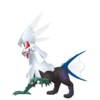
|
Fighting 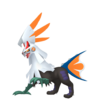
|
Flying 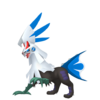
|
Poison 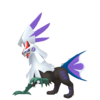
|
Ground 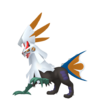
|
Rock 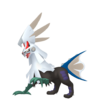
|
Bug 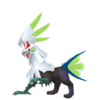
|
Ghost 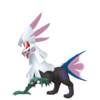
|
Steel 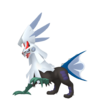
|
Fire 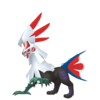
|
Water 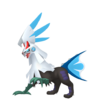
|
Grass 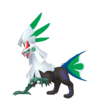
|
Electric 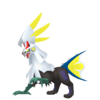
|
Psychic 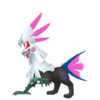
|
Ice 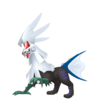
|
Dragon 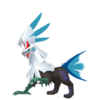
|
Dark 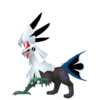
|
Fairy 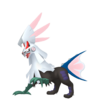
|
Minior
Minior has two forms that it changes between with its Ability, Shields Down. It will change from Core Form to Meteor Form when it is sent out into battle or at the end of a turn if its HP is above 50% of its maximum HP. If its HP falls below 50% of its maximum HP, its shell breaks, and it changes back to Core Form at the end of that turn. Outside of battle, Minior is always in Core Form. However, wild Minior are always encountered in Meteor Form.
Meteor Form and Core Form have different stats:
- Meteor Form Minior has lower attacking stats and Speed, but higher defenses.
- Core Form Minior has higher attacking stats and Speed, but lower defenses.
Due to its Ability Shields Down, Meteor Form Minior cannot be afflicted by status conditions or become drowsy due to Yawn.
A Minior's Core Form can be one of seven different colors. Bred Minior will always have the same Core color as their parent.
|
| ||||||||||||||||||||||||||||||||||||||||||||||||||||||||||||||||||||||||
Red Core Rock Flying |
Orange Core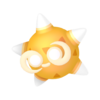 Rock Flying |
Yellow Core Rock Flying |
Green Core Rock Flying |
Blue Core Rock Flying |
Indigo Core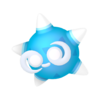 Rock Flying |
Violet Core Rock Flying |
Mimikyu
Mimikyu has two forms called Disguised Form and Busted Form. As of Generation VIII, when a Mimikyu in Disguised Form that has the Disguise Ability is hit by a damaging attack, it loses only 1/8 of its maximum HP and instead transforms into Busted Form. (Prior to Generation VIII, it would take no damage at all.) In Busted Form, its disguise slumps to the side and it can be damaged by normal means. Mimikyu will stay in Busted Form until either it faints or the battle ends.
Disguised Form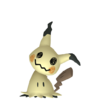 Ghost Fairy |
Busted Form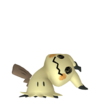 Ghost Fairy |
Necrozma
Necrozma has three additional forms; Dusk Mane Necrozma, Dawn Wings Necrozma, and Ultra Necrozma. All three forms were introduced in Pokémon Ultra Sun and Ultra Moon.
Dusk Mane Necrozma is the form it attains from absorbing Solgaleo. The player can induce and undo this fusion with the N-Solarizer. After fusing, Necrozma will attempt to learn Sunsteel Strike, and can use Solganium Z with it to access Solgaleo's exclusive Z-Move, Searing Sunraze Smash. Its cry is a combination of normal Necrozma and Solgaleo's cries.
Dawn Wings Necrozma is the form it attains from absorbing Lunala. The player can induce and undo this fusion with the N-Lunarizer. After fusing, Necrozma will attempt to learn Moongeist Beam, and can use Lunalium Z with it to access Lunala's exclusive Z-Move, Menacing Moonraze Maelstrom. Its cry is a combination of normal Necrozma and Lunala's cries.
If Dusk Mane or Dawn Wings Necrozma attempts to unfuse from Solgaleo or Lunala while it knows the borrowed move (Sunsteel Strike or Moongeist Beam), that move will be forgotten. If the borrowed move was its only move, Necrozma will learn Confusion.
Each player can have a maximum of one Dusk Mane Necrozma and one Dawn Wings Necrozma at a time per game; having both at the same time requires trading for a second Necrozma. As long as it's fused with Solgaleo or Lunala, Necrozma cannot be traded, released, or moved into Pokémon Bank or Pokémon HOME.
Ultra Necrozma is a third form Necrozma can attain if it entered a battle in one of the previous two forms. While holding its exclusive Z-Crystal, Ultranecrozium Z, the player can use the Ultra Burst command from the move menu to transform into Ultra Necrozma. Once transformed, Ultra Necrozma can also use Ultranecrozium Z and Photon Geyser on a subsequent turn to access its exclusive Z-Move, Light That Burns the Sky. Ultra Necrozma will revert to its previous form when it faints, or the battle ends. If Ultra Necrozma faints and is Revived, it will not be able to Ultra Burst again for the remainder of the battle.
|
|
|
| ||||||||||||||||||||||||||||||||||||||||||||||||||||||||||||||||||||||||||||||||||||||||||||||||||||||||||||||||||||||||||||||||||||||||||||||||||||||||||||||||||
Magearna
Magearna has an alternate form called Original Color Magearna. The only difference between Magearna's forms is aesthetic: the Original Color form is red and gold. Prior to the launch of Pokémon HOME, the Original Color form was not able to be legitimately obtained, and it only appeared in an official capacity in Volcanion and the Mechanical Marvel. Since Pokémon HOME's release in February 2020, if a player completes the National Pokédex (including Mythical Pokémon, but excluding multiple forms), they will receive a gift containing an Original Color Magearna.
Magearna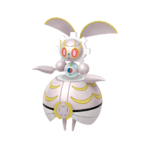 Steel Fairy |
Original Color Magearna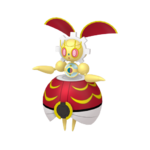 Steel Fairy |
Cramorant
Cramorant has three forms, all activated by its Ability, Gulp Missile. Cramorant will start in its standard form.
If Cramorant uses Surf or Dive while it is over 50% of its maximum HP, it will change into Gulping Form, and will have caught an Arrokuda in its beak. If Gulping Form Cramorant is hit with a damaging attack, the attacker will take damage equal to 25% of their maximum HP, and have their Defense lowered by one stage.
If Cramorant uses Surf or Dive while it is at or below 50% of its maximum HP, it will change into Gorging Form, where it has a Pikachu caught in its throat. If Gorging Form Cramorant is hit with a damaging attack, the attacker will take damage equal to 25% of their maximum HP, and become Paralyzed.
After a Cramorant in either Gulping Form or Gorging Form is hit by a damaging attack, it will revert back to its standard form.
Cramorant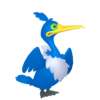 Flying Water |
Gulping Form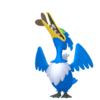 Flying Water |
Gorging Form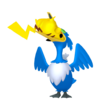 Flying Water |
Toxtricity
Toxtricity has two forms, Amped Form and Low Key Form, that vary based on its nature. Both forms of Toxtricity have the same stats, but learn slightly different moves, and have a different pool of Abilities. Both have access to the same Gigantamax form, which was released on February 6th, 2020.
|
| ||||||||||||||||||||||||||||||||||||||||||||||||||||||||||||||||||||||||||||||||||||
| Lv. |  Amped Form Electric Poison |
 Low Key Form Electric Poison |
|---|---|---|
| Evo. | Spark | |
| 1 | Spark | |
| 1 | Eerie Impulse | |
| 1 | Belch | |
| 1 | Tearful Look | |
| 1 | Nuzzle | |
| 1 | Growl | |
| 1 | Flail | |
| 1 | Acid | |
| 1 | Thunder Shock | |
| 1 | Acid Spray | |
| 1 | Leer | |
| 1 | Noble Roar | |
| 4 | Charge | |
| 8 | Shock Wave | |
| 12 | Scary Face | |
| 16 | Taunt | |
| 20 | Venoshock | Venom Drench |
| 24 | Screech | |
| 28 | Swagger | |
| 32 | Toxic | |
| 36 | Discharge | |
| 40 | Poison Jab | |
| 44 | Overdrive | |
| 48 | Boomburst | |
| 52 | Shift Gear | Magnetic Flux |
| Moves in bold are STAB. Moves in italics do no damage. | ||
Sinistea and Polteageist
Sinistea and Polteageist each have two forms, Phony Form and Antique Form[1]. Phony Form Sinistea require a Cracked Pot to evolve into Polteageist, while Antique Form requires a Chipped Pot. The Antique Form of both species has a mark of authenticity hidden on its base. They also have distinct Pokédex entries. Otherwise, their stats, Abilities, and moves are identical. Unlike many other forms, the Antique Form is not passed down by breeding; all hatched Sinistea will be in Phony Form regardless of their parents.
Phony Form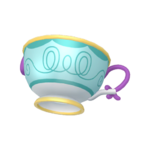 Ghost 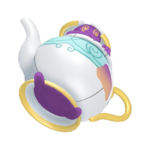 Ghost |
Antique Form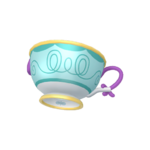 Ghost 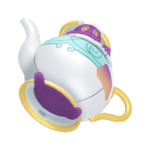 Ghost |
Alcremie
Alcremie's form depends on two different parameters: its cream and type of Sweet. Cream affects the color of Alcremie's body, while the Sweet affects its eye color and head ornaments. There are nine different types of cream colors and seven different types of Sweets. There can be any combination of creams with sweets, resulting in 63 different non-Gigantamax forms of Alcremie, not including its Shiny coloration. Each of Alcremie's creams have different menu sprites and Pokédex entries, while Sweets only affect the appearance of Alcremie's 3D model; all of Alcremie's menu sprites show it with a Strawberry Sweet, regardless of its actual Sweet. Alcremie's forms are purely aesthetic, having no effect at all on its performance in battles.
Alcremie's form is decided when it evolves from Milcery. Milcery evolves from Alcremie while holding a Sweet when its Trainer spins and strikes a pose while it is in the party. The type of sweet on Alcremie is dependent on which Sweet it was holding, while the cream color varies depending on time of day, the length of the spin, and whether the Trainer was spinning clockwise or counterclockwise.
All Alcremie forms have access to the same Gigantamax form. Normally, the only Gigantamax Alcremie that can be encountered in Max Raid Battles have Vanilla Cream and the Strawberry Sweet. However, all creams appeared as Gigantamax Alcremie in limited-time Wild Area News, but only with the Strawberry Sweet. Additionally, Milcery with the Gigantamax Factor were also available in limited-time Wild Area News, enabling players to obtain a Gigantamax Alcremie with any Sweet and cream combination.
Shiny Alcremie always has the same color, regardless of its actual cream (which is still visible in its menu sprite). Unlike cream and Sweet, Alcremie's Shiny coloration is visible in its Gigantamax form.
| Vanilla Cream | Ruby Cream | Matcha Cream | Mint Cream | Lemon Cream | Salted Cream | Ruby Swirl | Caramel Swirl | Rainbow Swirl | Shiny | |
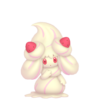 Fairy |
 Fairy |
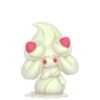 Fairy |
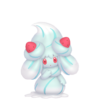 Fairy |
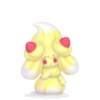 Fairy |
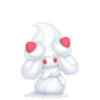 Fairy |
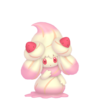 Fairy |
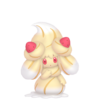 Fairy |
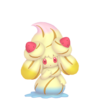 Fairy |
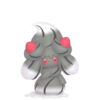 Fairy | |
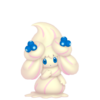 Fairy |
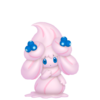 Fairy |
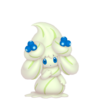 Fairy |
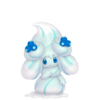 Fairy |
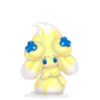 Fairy |
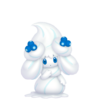 Fairy |
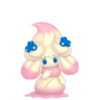 Fairy |
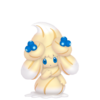 Fairy |
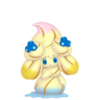 Fairy |
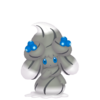 Fairy | |
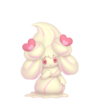 Fairy |
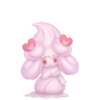 Fairy |
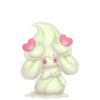 Fairy |
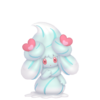 Fairy |
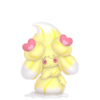 Fairy |
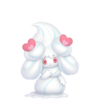 Fairy |
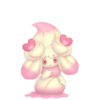 Fairy |
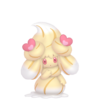 Fairy |
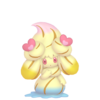 Fairy |
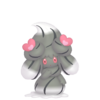 Fairy | |
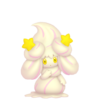 Fairy |
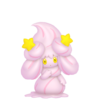 Fairy |
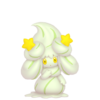 Fairy |
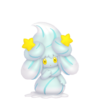 Fairy |
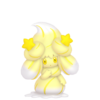 Fairy |
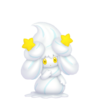 Fairy |
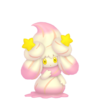 Fairy |
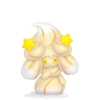 Fairy |
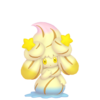 Fairy |
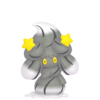 Fairy | |
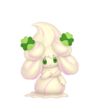 Fairy |
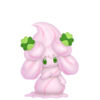 Fairy |
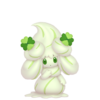 Fairy |
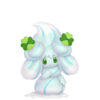 Fairy |
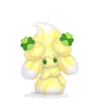 Fairy |
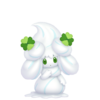 Fairy |
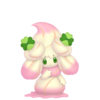 Fairy |
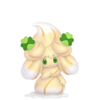 Fairy |
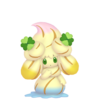 Fairy |
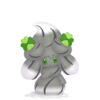 Fairy | |
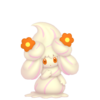 Fairy |
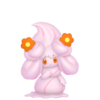 Fairy |
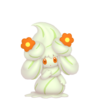 Fairy |
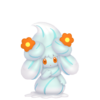 Fairy |
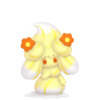 Fairy |
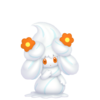 Fairy |
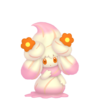 Fairy |
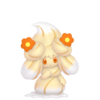 Fairy |
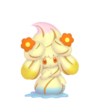 Fairy |
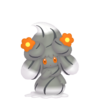 Fairy | |
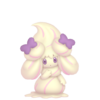 Fairy |
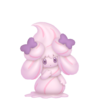 Fairy |
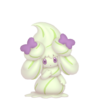 Fairy |
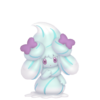 Fairy |
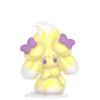 Fairy |
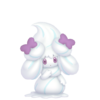 Fairy |
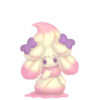 Fairy |
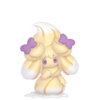 Fairy |
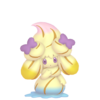 Fairy |
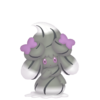 Fairy |
Eiscue
Eiscue has two forms called Ice Face Form and Noice Face Form. When an Eiscue in Ice Face Form that has the Ice Face Ability is hit by a physical move, it does not take damage and instead transforms into Noice Face Form. In Noice Face Form, it has decreased Defense and Special Defense and increased Speed, and it can be damaged by normal means. When in Noice Face Form, Eiscue will change back to Ice Face form if hail begins while it is on the field, or if it is sent out into battle while it is hailing.
|
| ||||||||||||||||||||||||||||||||||||||||||||||||||||||||||||||||||||||||||||||||||||
Morpeko
Morpeko has two forms that it switches between using its Hunger Switch Ability: Full Belly Mode and Hangry Mode. When in Full Belly Mode, its signature move Aura Wheel becomes Electric-type. When in Hangry Mode, Aura Wheel becomes Dark-type. It will start in Full Belly Mode, and then switch between forms at the end of every turn.
Full Belly Mode Electric Dark |
Hangry Mode Electric Dark |
Zacian and Zamazenta
The Legendary Pokémon Zacian and Zamazenta have two forms each that change their appearance, stats, and types. Their default forms are both called Hero of Many Battles form. While in battle, Zacian becomes Crowned Sword Zacian if holding a Rusted Sword, while Zamazenta becomes Crowned Shield Zamazenta if holding a Rusted Shield. Similar to Xerneas, Zacian and Zamazenta will appear in their Hero of Many Battles form outside of battle, even if they are holding their respective items.
When a battle begins, the move Iron Head will become Behemoth Blade for Crowned Sword Zacian, or Behemoth Bash for Crowned Shield Zamazenta. The move will change back to Iron Head at the end of battle.
|
| ||||||||||||||||||||||||||||||||||||||||||||||||||||||||||||||||||||||||||||||||||||
|
| ||||||||||||||||||||||||||||||||||||||||||||||||||||||||||||||||||||||||||||||||||||
Eternatus
During the climax of Pokémon Sword and Shield, the player confronts a powered-up version of Eternatus known as Eternamax Eternatus, which is fought in a semi-scripted Max Raid Battle and uses Max Moves like a Dynamaxed Pokémon. This form has the highest base stats of any form of Pokémon to date and is currently unobtainable by the player. However, the form briefly appears in the move animation for Eternabeam.
|
| ||||||||||||||||||||||||||||||||||||||||||||||||||||||||||||||||||||||||||||||||||||
Urshifu
Urshifu has two forms, dependent on which of the Towers of Two Fists its pre-evolution Kubfu evolved at. Urshifu's Single Strike Style is Fighting/Dark and is obtained by evolving Kubfu at the Tower of Darkness. Urshifu’s Rapid Strike Style is Fighting/Water and is obtained by evolving Kubfu at the Tower of Waters. Both forms have the same base stats but have different movesets, types, and Gigantamax forms.
Single Strike Style Fighting Dark |
Rapid Strike Style Fighting Water |
Zarude
Zarude has an alternate form called Dada. It wears a pink, ripped cape bearing Celebi's National Pokédex number, and it was reported to have left its pack to raise a human child, as seen in Secrets of the Jungle.
Zarude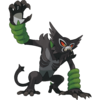 Dark Grass |
Dada Zarude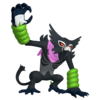 Dark Grass |
Calyrex
Calyrex has two alternate forms, Ice Rider and Shadow Rider, which were introduced in Pokémon Sword and Shield's Crown Tundra Expansion. The Reins of Unity can be used to combine with, or separate from, either Glastrier or Spectrier and shift between these forms and its base form. Each form has its own Ability that combines Calyrex's base Unnerve Ability with either Chilling Neigh or Grim Neigh, but in both cases the combined Ability is called As One.
Ice Rider form is the result of combining with Glastrier and is Psychic/Ice-type. After combining, Calyrex will learn Glacial Lance.
Shadow Rider form is the result of combining with Spectrier and is Psychic/Ghost-type. After combining, Calyrex will learn Astral Barrage.
If Calyrex attempts to separate from Glastrier or Spectrier, it will forget Glacial Lance or Astral Barrage, along with any other moves it might have that Calyrex can't learn in its base form. If this process would leave Calyrex without any moves, it will learn Confusion.
Each player can have a maximum of one of Calyrex's Rider forms on a save file at a time and must separate them before Calyrex can be combined with the other Pokémon. As long as Calyrex is combined with Glastrier or Spectrier, it cannot be traded, released, or moved into Pokémon HOME.
|
|
| ||||||||||||||||||||||||||||||||||||||||||||||||||||||||||||||||||||||||||||||||||||||||||||||||||||||||||||
| Lv. |  Calyrex Psychic Grass |
 Ice Rider Calyrex Psychic Ice |
 Shadow Rider Calyrex Psychic Ghost |
|---|---|---|---|
| 1 | N/A | Glacial Lance | Astral Barrage |
| Tackle | |||
| Tail Whip | |||
| Double Kick | |||
| Avalanche | Hex | ||
| Stomp | |||
| Torment | Confuse Ray | ||
| Mist | Haze | ||
| Icicle Crash | Shadow Ball | ||
| Take Down | |||
| Iron Defense | Agility | ||
| Thrash | |||
| Taunt | Disable | ||
| Double-Edge | |||
| Swords Dance | Nasty Plot | ||
| Pound | |||
| Mega Drain | |||
| Confusion | |||
| Growth | |||
| 8 | Life Dew | ||
| 16 | Giga Drain | ||
| 24 | Psyshock | ||
| 32 | Helping Hand | ||
| 40 | Aromatherapy | ||
| 48 | Energy Ball | ||
| 56 | Psychic | ||
| 64 | Leech Seed | ||
| 72 | Heal Pulse | ||
| 80 | Solar Beam | ||
| 88 | Future Sight | ||
| Moves in bold are STAB. Moves in italics do no damage. | |||
Form-like transformations
Some Pokémon have transformations that may resemble forms and have official names, but they do not register as discrete forms in the Pokédex.
Reshiram, Zekrom, and Kyurem
Reshiram, Zekrom, White Kyurem, and Black Kyurem enter Overdrive mode when their emotions surge, lighting parts of their bodies in flames or electricity in the process. Reshiram and Zekrom enter Overdrive mode when using their signature moves (Fusion Flare and Blue Flare for Reshiram, Fusion Bolt and Bolt Strike for Zekrom) and are usually not in Overdrive mode otherwise. Black and White Kyurem, however, are always in Overdrive mode in battle.
Reshiram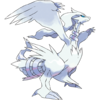 Dragon Fire |
Zekrom Dragon Electric |
White Kyurem Dragon Ice |
Black Kyurem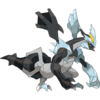 Dragon Ice |
In Overdrive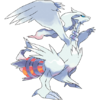 Dragon Fire |
In Overdrive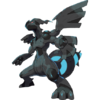 Dragon Electric |
In Overdrive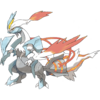 Dragon Ice |
In Overdrive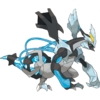 Dragon Ice |
Solgaleo and Lunala
Solgaleo and Lunala enter special phases when using their powers, shining brighter than normal. Solgaleo's phase is called the Radiant Sun phase, while Lunala's is the Full Moon phase. They both enter this phase while in Ultra Space (although not while in battle) or when using their signature moves. For Solgaleo, these moves are Sunsteel Strike and Searing Sunraze Smash; for Lunala, these are Moongeist Beam and Menacing Moonraze Maelstrom.
Solgaleo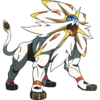 Psychic Steel |
Radiant Sun phase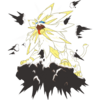 Psychic Steel |
Lunala Psychic Ghost |
Full Moon phase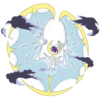 Psychic Ghost |
Marshadow
When Marshadow attacks or becomes worked up, the flames on its body flare green. This transformation is called Zenith Marshadow.[2]
Marshadow Fighting Ghost |
Zenith Marshadow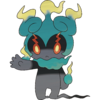 Fighting Ghost |
In other games
Pokémon Shuffle
- Main article: List of Pokémon by Pokémon Shuffle list number
In Pokémon Shuffle, Pokémon with different forms have different Skills and can have different Attack Powers and max levels.
Most Pokémon with forms in the core series games also have those forms in Pokémon Shuffle. Many Pokémon have a "Winking" form, notably including most of the starter Pokémon. There are also a few Pokémon with a "Spooky" or "Holiday" form. Pikachu has a large variety of forms, mostly unique to Pokémon Shuffle.
Pokémon GO
- Main article: Form differences in Pokémon GO
All forms in Pokémon GO are determined at the time of capture and cannot be changed. Although every species has one Pokédex entry each, a Pokémon is considered different from any of its alternate forms; this means that even if a player has one form of the Pokémon species registered in the Pokédex, an alternate form will still appear as a silhouette in the Nearby screen, and receiving one in a trade will be considered a Special Trade.
Trivia
- As of Generation VIII, three Pokémon with form differences remain unavailable. These are:
- ???-type Arceus, which only existed in the code for the Generation IV games and is otherwise unavailable without hacking.
- Eternal Flower Floette, which only exists in the code for all Generation VI and Generation VII games, and remains in the data of Pokémon HOME.
- Eternamax Eternatus, which is only seen in the climax of Pokémon Sword and Shield and when Eternatus uses Eternabeam.
In other languages
Form
| |||||||||||||||||||||||||||||||||||||||||||||||
Forme
| |||||||||||||||||||||||||||||||||||||||||||||||
See also
References




